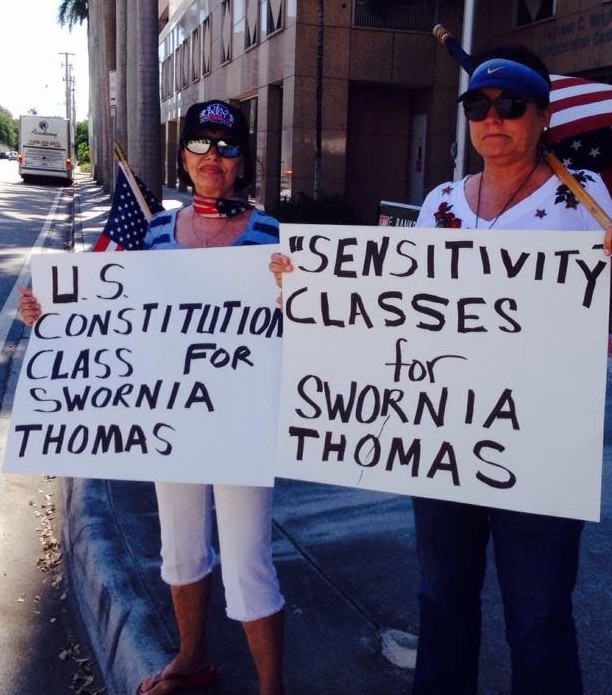While I am a strong believer in states rights under the 10th Amendment, I also believe that states should follow existing federal laws. Following and enforcing immigration laws, for example, has been the rallying cry for Republicans and some Democrats. If Florida is harmed by an immigration law then Governor Scott should work with the state congressional delegation to alter or abolish the law. The Florida legislature should not pass and Governor Scott sign a law that violates federal immigration law.
Case in point is the Florida legislature passing HB 851 giving illegal aliens in-state college tuition. This effort has been fully embraced by Governor Rick Scott, former Governors Jeb Bush and Bob Martinez in the name of “lowering the cost of tuition for all Florida students.” The problem is HB 851 violates federal immigration law and requires Florida to provide the same in-state college tuition rate to all citizens of the United States.
According to Hans A. von Spakovsky and Charles D. Stimson giving in-state college tuition to illegal aliens violates federal law. The following is the full text of their November 2011 column titled “Providing In-State Tuition for Illegal Aliens: A Violation of Federal Law“:
Federal law prohibits state colleges and universities from providing in-state tuition rates to illegal aliens “on the basis of residence within the State”—unless the same in-state rates are offered to all citizens of the United States. Today, 12 states are circumventing this federal law, and the legal arguments offered to justify such actions are untenable, no matter what other policy arguments are offered in their defense. Because at least one federal court of appeals has held that there is no private right of action under the specific statute in question—§ 1623 of the Illegal Immigration Reform and Immigrant Responsibility Act of 1996—the U.S. Department of Justice must enforce this statutory provision against states that have violated federal law. Yet even as it sues states like Arizona and Alabama for trying to assist the enforcement of federal immigration law, the U.S. government refuses to sue states that are incontrovertibly and brazenly violating an unambiguous federal immigration law. Such inaction is unacceptable: The President and the Attorney General have an obligation to enforce every provision of the United State’s comprehensive federal immigration regulations—including the federal law prohibiting state colleges and universities from providing in-state tuition rates to illegal aliens “on the basis of residence within the State.”
In 1996, Congress passed—and President Bill Clinton signed into law—the Illegal Immigration Reform and Immigrant Responsibility Act (IIRIRA).[i] Section 1623 of this federal statute prohibits state colleges and universities from providing in-state tuition rates to illegal aliens “on the basis of residence within the State” unless the same in-state rates are offered to all citizens of the United States.[ii] Today, 12 states[iii] allow individuals who are in the United States illegally to pay the same in-state tuition rates as legal residents of the states[iv]—without providing the same rates to others. By circumventing the requirements of § 1623 these states are violating federal law, and the legal arguments offered to justify such actions are untenable, no matter what other policy arguments are offered in their defense.
A Nation of Laws, Not of Men
The United States is a country of immigrants—men and women who sought opportunity and freedom in an exceptional new land. Americans take pride in their heritage and this country’s generous policies regarding legal immigration. Yet, as citizens of a sovereign nation, Americans retain the right to decide who can and cannot enter this country—and what terms immigrants and visitors must accept as a condition of residing in the United States. As mandated by the U.S. Constitution, Congress sets America’s immigration policy. State officials have considerable influence in Congress over the crafting of immigration laws, and they may take steps to help enforce federal law.[v] However, state officials cannot act contrary to a congressional statute.
America is a “nation of laws, not of men,” and thus her citizens must abide by the rule of law. But even if the operation of the rule of law was not imbedded in the U.S. Constitution and legal system, every generation of Americans should re-affirm its virtue and security. These concepts, ancient as they are, and quaint as they may sound to some, provide the bedrock principles of this nation’s constitutional republic. To abandon them in individual cases—where, for example, it seems opportunistic or personally appealing—is to render them unavailable in the preservation of all other rights.
The Constitution, the States, and Immigration
Article 1, Section 8, Clause 4 of the United States Constitution provides that Congress has the power to “establish an uniform Rule of Naturalization.” Over the decades, Congress has done just that, imposing a variety of conditions on those who wish to immigrate (e.g., such individuals must do so openly and in accordance with established legal process) and on those who might be visiting (e.g., such individuals must not overstay their authorized visit).
Unambiguous federal law regarding who may receive the benefit of in-state college tuition is part of these conditions. Specifically, § 1623 of IIRIRA provides that
Notwithstanding any other provision of law, an alien who is not lawfully present in the United States shall not be eligible on the basis of residence within a State (or a political subdivision) for any postsecondary education benefit unless a citizen or national of the United States is eligible for such a benefit (in no less an amount, duration, and scope) without regard to whether the citizens or national is such a resident.[vi]
Thus, it is obvious that Congress meant to prohibit state colleges and universities from offering in-state tuition to illegal aliens unless the state institutions also offer in-state tuition to all students, regardless of whether they live in the state or in another state. Congress may have assumed that state colleges and universities would not be able to “afford” offering in-state rates to everyone because these schools rely on the higher tuition from out-of-state students to help subsidize public colleges, and thus they would not offer in-state rates to illegal aliens.[vii] But the law itself provides a choice and only requires states to treat out-of-state citizens and illegal aliens equally.
IIRIRA, once signed into law by President Clinton, should have settled this issue. But some states have continued to offer lower tuition to illegal aliens without offering the same to all students—a direct violation of federal law. Specifically, 12 states have circumvented the express language and clear intent of the statute by erecting proxy legal justifications for offering in-state tuition to illegal aliens. These states have asserted these legal arguments in courts and forced others to waste time and resources in litigation to try to enforce federal law. Such state policies not only violate federal law; they also:
- Encourage illegal immigration;
- Are fundamentally unfair to students from out-of-state who are U.S. citizens; and
- Force taxpayers to subsidize the education of illegal aliens.
Beyond these immediate concerns, there is another, larger issue at stake: the federal government’s preeminent power to regulate immigration. The Supreme Court has held that the “[p]ower to regulate immigration is unquestionably exclusively a federal power.”[viii] However, not every state action “which in any way deals with aliens is a regulation of immigration and thus per se pre-empted by this constitutional power, whether latent or exercised.”[ix] In order for a state statute affecting immigrants (legal or illegal) to be valid, it cannot be expressly preempted by federal immigration law and must “not otherwise conflict with federal law.”[x]
State laws that provide in-state tuition rates to illegal aliens are both expressly preempted by, and in conflict with, § 1623—unless the state also provides in-state tuition rates to all other American students regardless of their state of residence. However, none of the states that provide in-state tuition rates to illegal aliens have changed their state laws to provide such tuition rates to out-of-state students who are U.S. citizens.
Circumventing Federal Law 101
To avoid IIRIRA’s mandate that in-state tuition be determined “on the basis of residence within a State,” some state lawmakers have created alternative criteria through which students might qualify for in-state tuition. Such alternative criteria are intended to act as a substitute for actual residence, which, in turn, creates the patina of compliance with the federal statute: Since residence is not at issue, there is, so these states argue, no conflict between federal and state law. In reality, however, the states are targeting illegal aliens for in-state tuition.
Maryland’s Senate Bill 167, which was signed into law by Governor Martin O’Malley (D), is a typical example of such chicanery. This bill exempts individuals, including “undocumented immigrants,” from paying out-of-state tuition if the person attended a secondary school in the state for at least three years, graduated or received a GED in the state, proves that he or his parents have filed Maryland income tax returns annually for the three years the student attended school in Maryland, and states that they will file an application to become a permanent resident.[xi]
Maryland Attorney General Douglas F. Gansler provided a dubious legal opinion regarding Senate Bill 167 to Gov. O’Malley on May 9, 2011. Gansler concluded that federal law (in particular, 8 U.S.C. § 1623(a)) does not preempt Senate Bill 167. The opinion suggests that Senate Bill 167 is not subject to the preemptive effect of § 1623(a) because the former “looks to factors such as time of attendance in Maryland schools and graduation from Maryland schools to define an exemption from nonresident tuition” [xii] and not residence. There are at least two problems with that legal analysis.
First, federal law permits a state to grant in-state college tuition to an illegal alien only if the state affords the same benefit to non-Maryland residents. The purpose of that law is to allow a state to treat illegal aliens like nonresidents for college tuition purposes: If the state does not charge more to the latter than to in-state students, then it may charge the same amount to illegal aliens (who, in an abstract sense, are akin to non-Marylanders). But Maryland’s law does not use that formula; Gansler claims that the bill does not require “residence” in Maryland to attend college and receive in-state tuition since it looks to “time of attendance” in Maryland high schools.
However, the regulations of the Maryland Board of Education authorize local schools to require “proof of the residency of the child” for admission into public schools for kindergarten through high school.[xiii] In fact, the Web site for the Prince George’s County Public Schools says that “proof of residence shall be a prerequisite of admission to the public schools” and parents and guardians who are registering their children for school the first time must file an “Affidavit of Disclosure as required by law, verifying their legal residence in Maryland.”[xiv] Montgomery County also tells parents enrolling their children for the first time that “all students…must provide verification of age, identity, residency, and immunizations.”[xv]As the state’s attorney general, Gansler has constructive knowledge of this residency requirement. The fact that he ignores it throws into question the premise on which his entire legal opinion rests.
No one who lives in, and went to high school in, for example, Wyoming, could satisfy the eligibility requirements of Senate Bill 167; the new law does not apply to non-Marylanders. As such, because the Maryland bill does not put non-Maryland residents on a par with Marylanders, the bill cannot give illegal aliens a break on state tuition.
Second, Gansler’s letter states that “the entire purpose of the bill is to design a law that will enable the State to continue to provide services to young undocumented aliens.”[xvi] The purpose of the bill, therefore, is to achieve the result that Congress outlawed in 8 U.S.C. § 1623(a)—granting in-state college tuition to illegal aliens without also granting that benefit to non-Maryland residents.
The Supreme Court has repeatedly struck down state legislation enacted to evade federal statutory or constitutional requirements. Indeed, the Court has rejected such legislation even when state lawmakers do not reference a suspect or disfavored classification:
The states have no power, by taxation or otherwise, to retard, impede, burden, or in any manner control, the operations of the constitutional laws enacted by Congress to carry into execution the powers vested in the general government.[xvii]
For example, in 2000, the Court struck down a Hawaiian statute that limited voting in certain elections to individual descendants of those who lived in Hawaii prior to 1778.[xviii] The statute’s eligibility requirements made no mention of race but were an obvious pretext for Polynesian heritage.
These state statutes that are intended to provide in-state tuition to illegal aliens are similar pretextual attempts to evade the federal immigration statute.
The Martinez Legal Fig Leaf
The few federal cases on this issue filed by citizen university students and their parents against such state laws have not reached the substantive merits of the preemption issue because the courts have held that individuals do not have standing to sue under this statutory federal provision.
For example, in Day v Bond, the Tenth Circuit Court of Appeals dismissed the lawsuit brought by nonresident citizen university students and their parents against the state of Kansas. Section 1623 does not create a private right of action and the plaintiffs lacked standing to bring an equal protection claim.[xix] The court held that the injuries claimed by the plaintiffs failed to satisfy “the requisite standing criteria.” These injuries included:
- The denial of equal treatment caused by the Kansas law that made it impossible for nonresident U.S. citizens to obtain the same in-state benefits;
- The increased tuition faced by the plaintiffs since the burden of subsidizing illegal alien beneficiaries is passed along to other students through tuition hikes;
- The harm that results from competition for scarce tuition resources; and
- The extra tuition paid by nonresident plaintiffs during the academic year over the in-state tuition paid by nonresident illegal aliens, as a consequence of the discriminatory law.
On the other hand, illegal aliens who have sued states for denying admission to post-secondary institutions as a violation of their constitutional rights have had their lawsuits thrown out on the merits. InEqual Access Education v. Merten,[xx] a Virginia federal district court held that, although illegal aliens had standing to bring suit, Virginia was under no obligation to allow illegal aliens to attend Virginia colleges and universities. Virginia’s law was not preempted by federal law and did not violate due process: “It defies logic to conclude that…Congress left states powerless to deny admission to illegal aliens.”[xxi] The court concluded that the “persuasive inference to draw from § 1623 is that public post-secondary institutions need not admit illegal aliens at all, but if they do, these aliens cannot receive in-state tuition unless out-of-state United States citizens receive this benefit.”[xxii]
As the National Conference of State Legislatures notes in a report on in-state tuition for illegal aliens, in order to try and “maneuver around the [§ 1623] requirements, the eleven states that have enacted laws granting in-state tuition rates to undocumented students have tried to word the legislation so that it is contingent on high school attendance and graduation, and not based on residency within the state.”[xxiii]But Texas bases its definition of residency for college admission on an individual (or his parent) establishing domicile in Texas not later than one year before the academic term in which the student is enrolled in college or graduating from a Texas high school who “maintained a residence” continuously for three years before graduation.[xxiv] Similarly, California bases residency on high school attendance in California for three or more years and graduation from a California high school.[xxv]
The California Supreme Court bought into this legally questionable argument in Martinez v. Regents of the University of California.[xxvi] The court recognized that the question of federal preemption of California’s residency law depended on whether the three-year high school attendance requirement is an “exemption based on residence within California.” However, the court held that the requirement that a student attend a California high school for three years and graduate was not a residency requirement. It overturned the California Court of Appeals, which had come to the legally straightforward conclusion that the California law was intended to benefit illegal aliens living in the state and the “wording of the California statute…creates a de facto residence requirement.”[xxvii] The court of appeals did not consider it relevant that the eligibility criteria did not correlate 100 percent with residency.
The California Supreme Court made the illogical claim that because § 1623 is not an “absolute ban” on illegal aliens receiving such tuition benefits, that section of federal law is not in accord with the expressed intention of Congress in its immigration legislation to “remove the incentive for illegal immigration provided by the availability of public benefits.”[xxviii] The court also ignored the fact that the state had adopted the law specifically to benefit illegal aliens living in California and that the overwhelming majority of those who qualified for the benefit were only illegal aliens.
While this legally erroneous decision may be the law in California (at least for the time being), it is not the law anywhere else in the country. Although the U.S. Supreme Court denied a petition of certiorari filed by the plaintiffs, it is black letter law that such a denial has no precedential effect whatsoever;[xxix]this issue has not yet been decided on the merits by any federal court.
And yet, offending states continue to ignore the clear language provided by a federal court in the Mertendecision, and instead rely on the preferred outcome found in a state supreme court ruling—a shortsighted and legally specious approach to governing.
Unwise Public Policy
Giving illegal aliens a financial break at state colleges and universities is not only illegal; it is also immensely unpopular with American taxpayers. An August 2011 Rasmussen poll found that 81 percent of voters oppose providing in-state tuition rates to illegal aliens. Seventy-two (72) percent of voters believe parents should be required to prove their legal residency when registering their children for public school.[xxx]
These results, however, should hardly come as a surprise: In 2005, it was estimated that the cost to taxpayers of providing in-state tuition in California was between $222.6 million and $289.3 million, while the cost to Texas taxpayers was between $80.2 million and $104.4 million.[xxxi]
Granting financial preference to illegal aliens also discriminates against otherwise qualified citizen students from outside the state. Furthermore, states that offer in-state tuition to illegal aliens act as a magnet for more illegal aliens to come to the state. Arguments to the contrary are unpersuasive, and not supported by the facts.
An Obligation to Enforce Federal Law
States that offer in-state tuition for illegal aliens are in violation of federal law. In doing so, these states are also acting against the will of the American people.
The applicable statute and the case law are clear: If there is no private right of action under § 1623, the U.S. Department of Justice must enforce this statutory provision against states that have violated federal law. Yet even as it sues states like Arizona and Alabama for trying to assist the enforcement of federal immigration law, the U.S. government refuses to sue states that are incontrovertibly and brazenly violating an unambiguous federal immigration law.
The President and the Attorney General have an obligation to enforce the provisions of the United States’ comprehensive federal immigration regulations—including the federal law prohibiting state colleges and universities from providing in-state tuition rates to illegal aliens “on the basis of residence within the State.”
ABOUT HANS A VON SPAKOVSKY AND CHARLES D. STIMSON
Hans A. von Spakovsky and Charles D. Stimson are both Senior Legal Fellows in the Center for Legal & Judicial Studies at The Heritage Foundation; von Spakovsky served as Counsel to the Assistant Attorney General for Civil Rights at the Justice Department (2002–2005) and Stimson was a federal prosecutor and later Deputy Assistant Secretary of Defense (2006–2007).



















